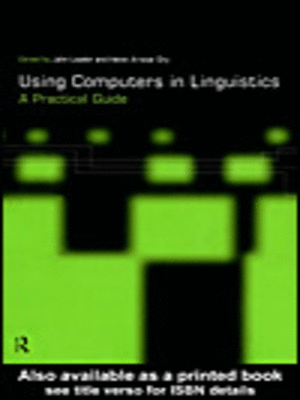
Sign up to save your library
With an OverDrive account, you can save your favorite libraries for at-a-glance information about availability. Find out more about OverDrive accounts.
Find this title in Libby, the library reading app by OverDrive.



Search for a digital library with this title
Title found at these libraries:
| Library Name | Distance |
|---|---|
| Loading... |
Computing has had a dramatic impact on the discipline of linguistics and is shaping the way we conceptualize both linguistics and language.
Using Computers in Linguistics provides a non-technical introduction to recent developments in linguistic computing and offers specific guidance to the linguist or language professional who wishes to take advantage of them.
Divided into eight chapters, each of the expert contributors focus on a different aspect of the interaction of computing and linguistics looking either at computational resources: the Internet, software for fieldwork and teaching linguistics, Unix utilities, or at computational developments: the availability of electronic texts, new methodologies in natural language processing, the development of the CELLAR computing environment for linguistic analysis.
Features include:
* a glossary of technical terms, including acronyms
* chapter appendices which list and review relevant resources, such as books, software, URL's
* more extensive and regularly updated appendices of resources on the World Wide Web: http://www.routledge.com
Using Computers in Linguistics will be indispensable for anyone interested in linguistics.
Using Computers in Linguistics provides a non-technical introduction to recent developments in linguistic computing and offers specific guidance to the linguist or language professional who wishes to take advantage of them.
Divided into eight chapters, each of the expert contributors focus on a different aspect of the interaction of computing and linguistics looking either at computational resources: the Internet, software for fieldwork and teaching linguistics, Unix utilities, or at computational developments: the availability of electronic texts, new methodologies in natural language processing, the development of the CELLAR computing environment for linguistic analysis.
Features include:
* a glossary of technical terms, including acronyms
* chapter appendices which list and review relevant resources, such as books, software, URL's
* more extensive and regularly updated appendices of resources on the World Wide Web: http://www.routledge.com
Using Computers in Linguistics will be indispensable for anyone interested in linguistics.







